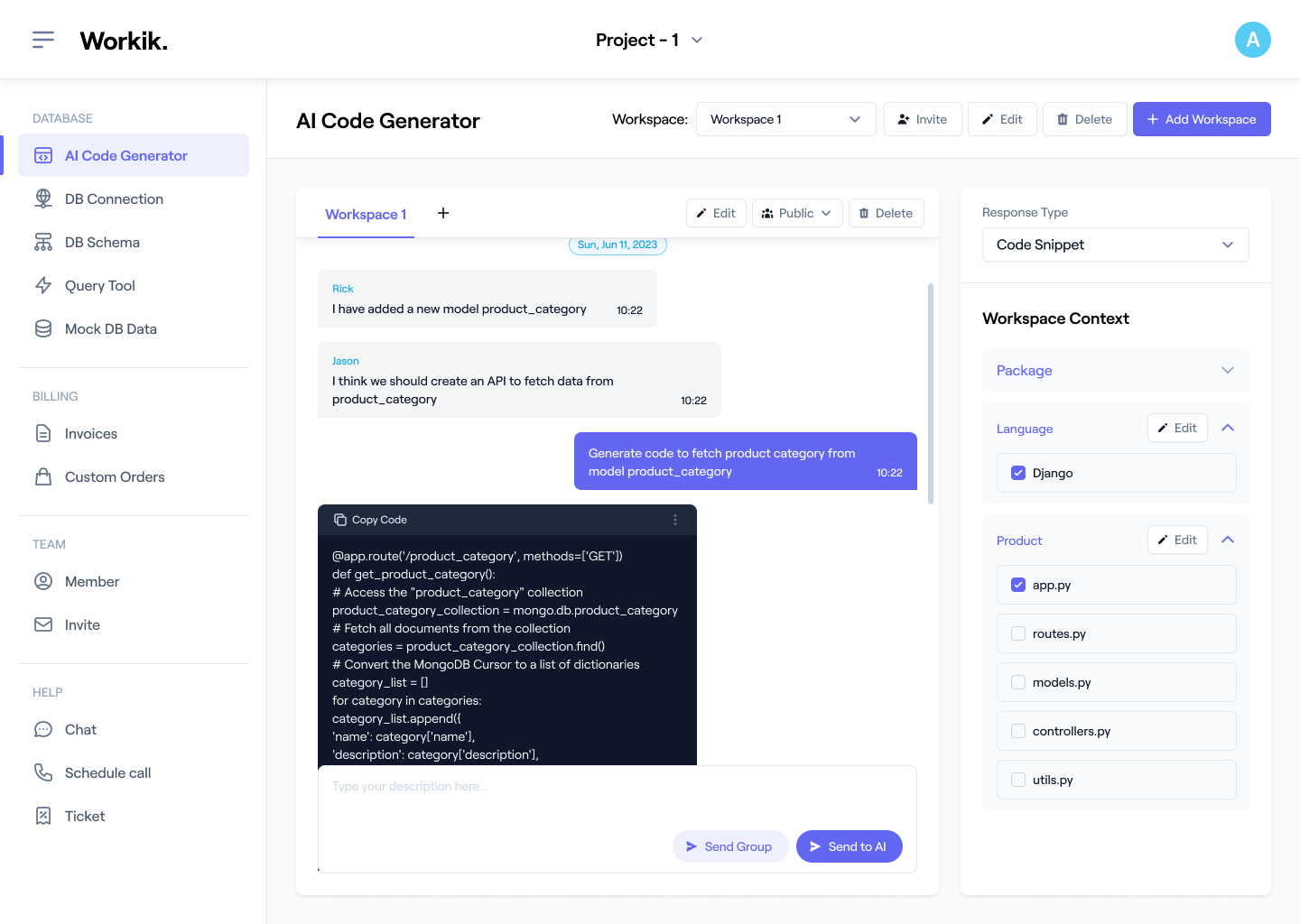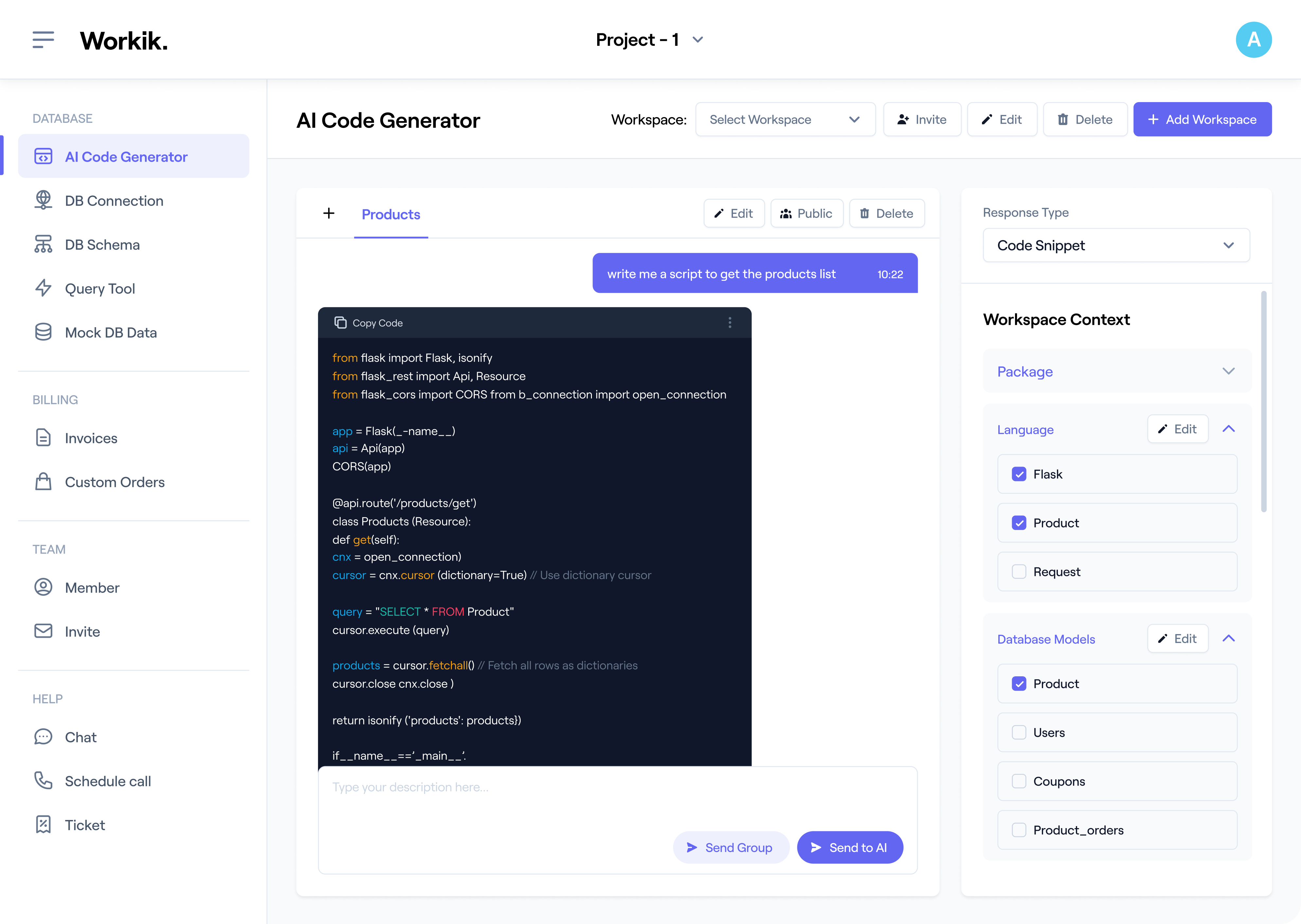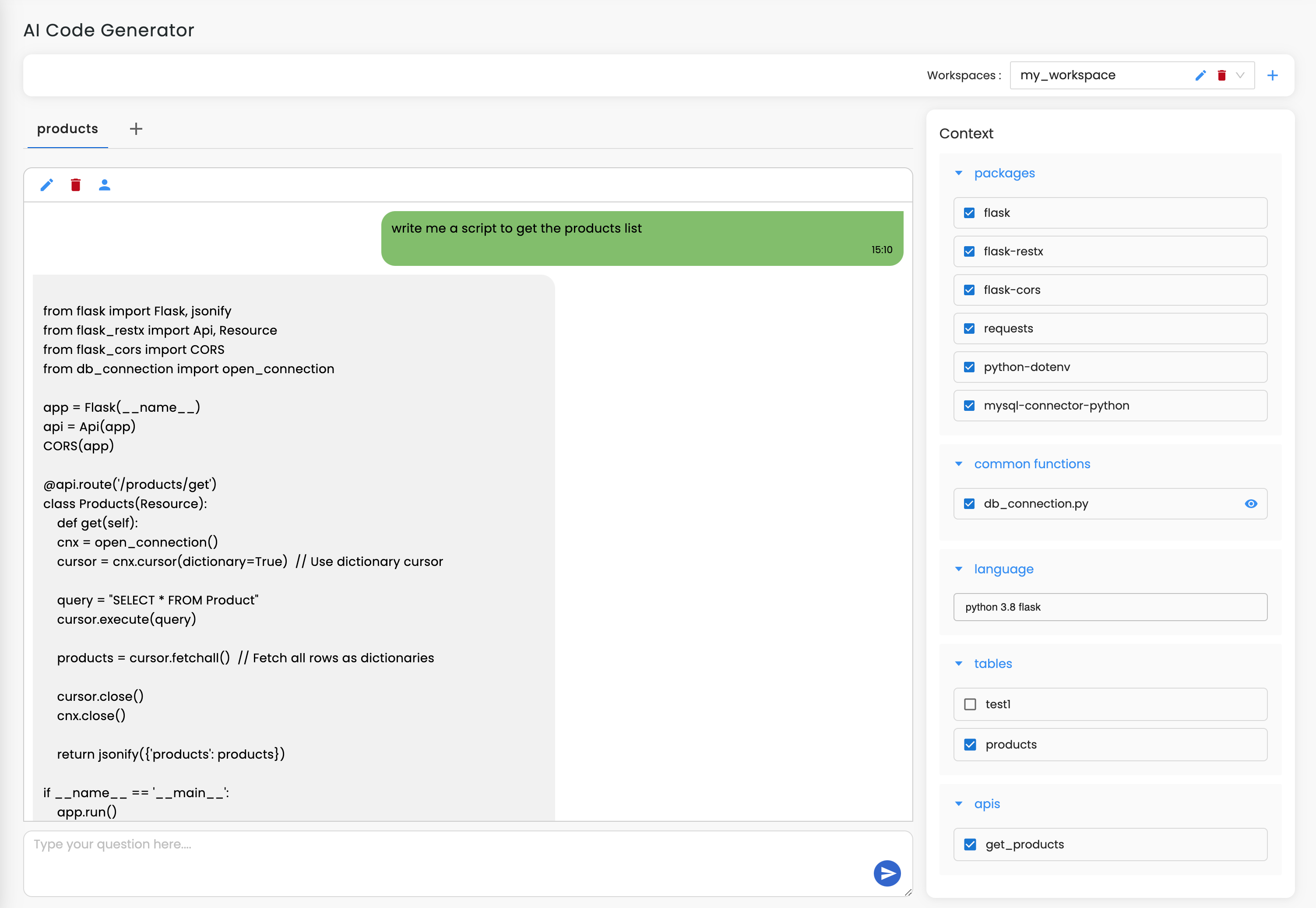
Join our community to see how developers are using Workik AI everyday.
Supported AI models on Workik
GPT 5.2, GPT 5.1 Codex, GPT 5.1, GPT 5 Mini, GPT 5, GPT 4.1 Mini
Gemini 3 Flash, Gemini 3 Pro, Gemini 2.5 Pro, Gemini 2.5 Flash
Claude 4.5 Sonnet, Claude 4.5 Haiku, Claude 4 Sonnet, Claude 3.5 Haiku
Deepseek Reasoner, Deepseek Chat, Deepseek R1(High)
Grok 4.1 Fast, Grok 4, Grok Code Fast 1
Models availability might vary based on your plan on Workik
Join our community to see how developers are using Workik AI everyday.
Features

Instant Plugin Creation
Use AI to generate custom plugins pre-configured for Babel, PostCSS, and ESLint to reduce setup time.

Optimize Build Performance
AI analyzes your setup to enable tree shaking, code splitting, and lazy loading for smaller bundles.

Build Framework-Specific Plugins
AI crafts plugins tailored to React, Vue.js, or Angular with support for HMR and asset handling.

Seamless Tool Integration
AI ensures compatibility for TypeScript, Rollup and TailwindCSS to create a unified workflow.
How it works
Register with Google or manually create an account on Workik.
Integrate repositories from GitHub, GitLab, or Bitbucket, and add frameworks like React, TypeScript, or PostCSS to tailor AI-generated plugins for your project’s needs.
Use AI to create, test, and debug Webpack plugins for tasks like dependency & cache management, build analysis, and more.
Invite team members to collaborate, share real-time feedback, and get AI-generated updates, configurations, and optimizations.


Expand
.png)
.png)
Expand


Expand


Expand


Expand


Expand


Expand


TESTIMONIALS
Real Stories, Real Results with Workik
Workik AI saved us hours by crafting custom plugins for React and Vue.js projects effortlessly.

Chase Williams
Frontend lead
Automating Webpack configurations with AI helped me focus on building features while ensuring optimal performance.

Kevin Tran
Junior Developer
Seamless integration with TypeScript and Rollup has simplified complex workflows and improved build reliability.

Martha Lopez
DevOps Enginee
What are some popular use cases for Workik AI-powered Webpack Plugin Code Generator?


Popular use cases of Workik AI Webpack Plugin Code Generation for developers include, but are not limited to:
* Develop plugins for bundling, code splitting, and dependency resolution.
* Generate plugins to enable features like Hot Module Replacement (HMR) or module federation.
* Optimize plugin code for caching and asset minification.
* Modernize legacy Webpack plugins to improve maintainability and compatibility.
* Create plugins for custom file handling, such as transforming Markdown or image optimization.
* Automate plugin integration with CI/CD pipelines for smoother deployments.
What context-setting options are available in Workik AI Webpack Plugin Code Generation?


Workik AI provides diverse context-setting options to help personalize AI output. Users can:
* Sync with repositories from GitHub, GitLab, or Bitbucket.
* Define frameworks and tools such as TypeScript, PostCSS, or TailwindCSS.
* Specify optimization goals like lazy loading, tree shaking, or dependency preloading.
* Add API blueprints via Postman or Swagger to connect plugins with external services.
* Set compatibility requirements for modern tooling like Rollup or Parcel.
What makes the Workik AI-generated plugins highly customizable?


Workik AI allows you to define specific parameters like file types, output paths, or build strategies. For example, you can generate a plugin to handle SVG icons differently by specifying inline usage for small files and external references for larger ones, all tailored to your project’s requirements.
Can I generate plugins using Workik AI for custom build monitoring?


Yes, Workik AI can create plugins to log build metrics like bundle size, asset count, or build duration, helping you monitor and optimize your Webpack builds.
Can I generate plugins for analytics integration with Workik AI?


Workik AI helps create plugins with analytics tools like Google Analytics or custom dashboards, enabling you to track user behavior or performance metrics directly from your builds.
Can Workik AI create plugins for feature toggles in builds?


Yes, Workik AI generates code to enable feature flags, such as toggling dark mode or beta features. For example, it can conditionally include specific components or assets based on environment variables, streamlining phased rollouts or A/B testing.
How does Workik AI support experimental Webpack features?


Workik AI crafts code for micro-frontends or WebAssembly for computationally heavy tasks. For instance, you can create a plugin to federate shared libraries between applications, reducing duplication and improving load speeds.
Can Workik AI help with internationalization plugins?


Absolutely, Workik AI creates plugins to help in tasks like extracting translation keys from React components or bundling locale-specific JSON files. For example, it can generate a plugin to load language packs dynamically based on a user's browser settings.
Generate Code For Free

Webpack Plugin: Question and Answer
A Webpack Plugin is an extension that modifies or enhances the Webpack build process. Plugins enable developers to perform a wide range of tasks such as optimizing assets, automating repetitive processes, or adding custom functionality to the build pipeline. By leveraging Webpack's extensibility, plugins allow for a highly customizable and efficient development workflow.
Popular frameworks and libraries supported by Webpack plugins include:
JavaScript Frameworks:
React, Vue.js, Angular
Styling Tools:
PostCSS, TailwindCSS, SASS
Build Optimization:
Babel, Rollup, Parcel
Asset Management:
ImageMin, CSSNano
Testing Frameworks:
Jest, Mocha
Static Site Generation:
Next.js, Nuxt.js
Popular use cases for Webpack plugins include:
Web Applications:
Compressing and minifying CSS, JavaScript, and images for faster page loads.
E-commerce:
Splitting large codebases into smaller, manageable chunks for improved performance.
Healthcare:
Sharing code between multiple applications to simplify micro-frontend architectures.
Media & Entertainment:
Enabling real-time updates during development without a full page reload.
Finance:
Ensuring consistent and conflict-free dependency resolution.
Career opportunities include roles such as Frontend Engineer, DevOps Engineer, and Web Performance Specialist. Plugin development is also valuable for Build Tool Engineers and JavaScript Framework Developers.
Workik AI provides extensive support for Webpack plugin development, which includes:
Code Creation:
Generates custom plugins for tasks like asset bundling, HMR, and tree shaking.
Debugging:
Identifies and resolves issues in plugin code, including incorrect configurations or runtime errors.
Optimization:
Suggests improvements for plugin performance and build efficiency.
Integration:
Builds plugins compatible with tools like TypeScript, PostCSS, or Babel.
Testing:
Creates test cases for ensuring plugin functionality across different environments.
Modernization:
Refactors legacy plugin code to align with the latest Webpack standards.
Workflow Automation:
Generates plugins for automating repetitive build processes, improving team productivity.
Explore more on Workik
Get in touch
Don't miss any updates of our product.
© Workik Inc. 2026 All rights reserved.

